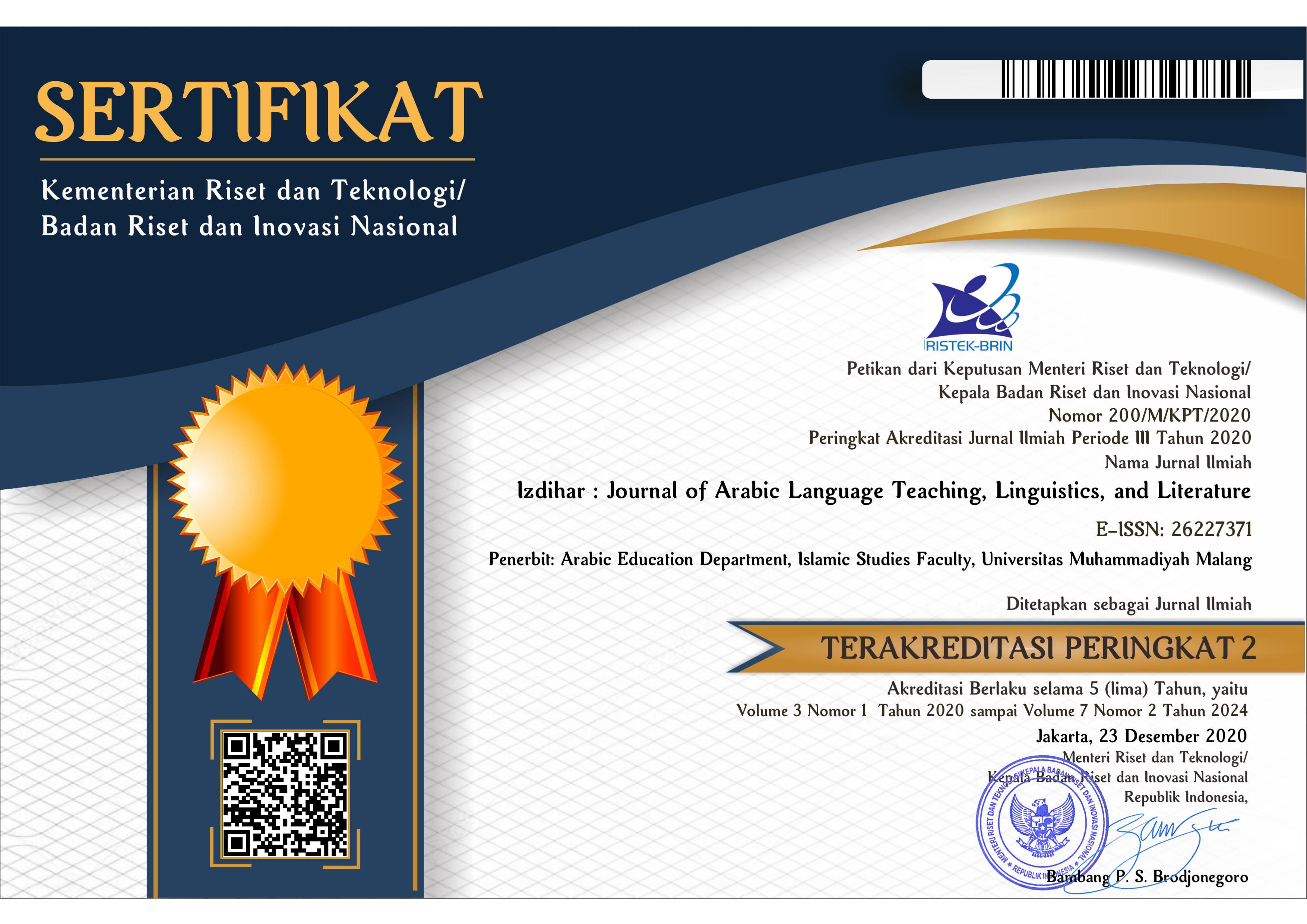Development of Electronic Book (ebook) based on Higher Order Thinking Skills (HOTs) for Learning Tathbiq Nahwi Ibtida'i in Higher Education
DOI:
https://doi.org/10.22219/jiz.v5i2.23290Keywords:
Development, Ebooks, HOTs, Tathbiq Nahwi Ibtida'iAbstract
This study aimed to develop an Electronic Book (Ebook) based on Higher Order Thinking Skills (HOTS) for the Tatbiq Nahwi Ibtida'i course and test its validity. The research method used is research and development (Research and Development); there are five steps in development, namely: (1) analysis, (2) design, (3) development, (4) evaluation, and (5) revision. This ebook product was tested on ten Department of Arabic Literature, the State University of Malang students taking the course—data collection techniques through interviews and observation. Data analysis techniques include data identification, grouping, presentation and explanation of data content, and conclusions. The data analysis technique used in quantitative data is percentage data analysis. The resulting development product is an Electronic Book (Ebook) based on Higher Order Thinking Skills (HOTS) for the Tatbiq Nahwi Ibtida'i course and the validity of the resulting product. The results of this product validation, namely: the percentage of reality from media experts is 96.7%. At the same time, the value of the material expert percentage validity is 98.5%. From the field test results, the correspondent's percentage value is 83.5%; this shows that the ebook is very valid.
Downloads
References
Anisatin, L., Sunarto, S., & Fauzi, M. F. (2021). Development of mE-Book Based Practical Arabic syntax. LISANIA: Journal of Arabic Education and Literature, 5(2), 187-203. DOI: http://dx.doi.org/10.18326/ lisania.v5i2.187-203
Ani, N. I., & Lazulva, L. (2020). Desain dan uji coba lkpd interaktif dengan pendekatan scaffolding pada materi hidrolisis garam. Journal of Natural Science and Integration, 3(1), 87-105. http://dx.doi.org/10.24014/jnsi.v3i1.9161
Aini, M. N., Widayati, S., Adhe, K. R., & Saroinsong, W. P. (2022). Pengembangan ebook mitigasi bencana kebakaran untuk anak usia 5-6 tahun. Aulad: Journal on Early Childhood, 5(3), 400-411. DOI: https://doi.org/10.31004/aulad.v5i3.401
Aswin, P., Irawati, M. H., & Saptasari, M. (2018, June). Persepsi mahasiswa biologi terhadap pengembangan ebook berbasis penelitian potensi lokal untuk matakuliah ekologi Program Studi Pendidikan Biologi Universitas Bengkulu. In Prosiding Seminar Nasional Pendidikan Biologi (pp. 137-140).
Belawati, T. (2003). Pengembangan bahan ajar. Jakarta: Universitas Terbuka.
Fauzan, M., Dariyadi, M. W., & Fara, E. W. (2019). Desain dan pengembangan bahan ajar flip book berbasis android untuk matakuliah tarkib mukatstsaf ibtida’i bagi mahasiswa Jurusan Sastra Arab Fakultas Sastra Universitas Negeri Malang. Kreativitas dan inovasi dalam pembelajaran bahasa Arab di Indonesia, 343-361.
Fauzan, M. (2019). Teori dan penerapan pengembangan bahan ajar sintaksis bahasa Arab berdasarkan metode induktif. Prosiding Konferensi Nasional Bahasa Arab, 5(5), 362-376.
Fauzan, M., Thoriquttyas, T., & Dariyadi, M. W. (2020). Tashmim ibtikar tadris al-lughah al-Arabiyyah bi wasilah android: Tathwir 14 maudhu’an li maaddah al-tarkib al-mukatssaf al-ibtidaiy bi Qismi al-Adab al-Arabiy, Kulliyyah al-Adab, Jamiah Malang al-Hukumiyyah. Asalibuna, 4(01), 63-76. DOI: https://doi.org/10.30762/asa.v4i1.2165
Fauzi, M. F. (2019). Tathwir Al-Lughaz al-Raqmy Li Madah al-Tathbiq Al-Sharfy 1 ‘ala al-Hatif al-Mahmul Ka al-Tadribat al-Idhafiyyah Kharij al-Fashl al-Dirasy. Buletin Al-Turas, 25(1), 129-139. DOI: https://doi.org/10.15408/bat.v25i1.11506
Fauzi, M. F., & Anindiati, I. (2020). E-learning pembelajaran bahasa Arab. UMMPress.
Fauzi, M. F., & Anindiati, I. (2021). Improving the Motivation of Students in Arabic Language Learning through Learning Management System. Izdihar: Journal of Arabic Language Teaching, Linguistics, and Literature, 4(3), 257-274. https://doi.org/10.22219/jiz.v4i3.19110
Fauzi, M. F., Anindiati, I., Nada, A. L. L. I., & Rahma, H. L. (2022, October). معيار التربية وعملية التعلم القياسية لتدريس اللغة العربية في إندونيسيا/Standard of education and learning process for teaching Arabic language in Indonesia. In MUDALLA: Proceeding International Conference on Arabic Language (Vol. 2, No. 1, pp. 272-280).
Haqqi, H., & Wijayati, H. (2019). Revolusi industri 4.0 di tengah society 5.0: Sebuah integrasi ruang, terobosan teknologi, dan transformasi kehidupan di era disruptif. Anak Hebat Indonesia.
Humairoh, A. F., & Hendra, F. (2018). Motivasi mahasiswa dalam belajar bahasa Arab antara harapan dan tantangan (studi kasus mahasiswa Prodi Sastra Arab Universitas Al-Azhar Indonesia. Dalam Wildana Wargadinata, dkk (Ed.). Prosiding KONASBARA IV (hlm. 378-387).
Hanikah, H., Faiz, A., Nurhabibah, P., & Wardani, M. A. (2022). Penggunaan media interaktif berbasis ebook di sekolah dasar. Jurnal Basicedu, 6(4), 7352-7359.
Hariawan, R., & Sakti, H. G. (2021). Pengembangan bahan ajar berbasis ebook pada pelajaran TIK untuk siswa kelas vii Mts. Hidayatussibyan NW Sangkerang. Jurnal Visionary: Penelitian dan Pengembangan dibidang Administrasi Pendidikan, 9(2), 66-74.
Indariani, A., Ayni, N., Pramuditya, S. A., & Noto, M. S. (2019). teknologi buku digital matematika dan penerapan potensialnya dalam distance learning. JNPM (Jurnal Nasional Pendidikan Matematika), 3(1), 1-12. DOI: https://doi.org/10.33603/jnpm.v3i1.1870
Mawarni, S., & Muhtadi, A. (2017). Pengembangan digital book interaktif mata kuliah pengembangan multimedia pembelajaran interaktif untuk mahasiswa teknologi pendidikan. Jurnal Inovasi Teknologi Pendidikan, 4(1), 84-96. https://doi.org/10.21831/jitp.v4i1.10114
Nisa, L. F., Fani, B. I., & Pratama, A. W. (2020, July). Kitab turats sebagai solusi efektifitas pembelajaran mata kuliah tarkib ibtida’i di Jurusan Sastra Arab Universitas Negeri Malang. In International Conference of Students on Arabic Language (Vol. 4, pp. 499-514).
Patmanthara, S. (2014). Pengembangan pembelajaran interaktif perkuliahan dasar-dasar rangkaian listrik dengan berbasis internet. Jurnal Cakrawala Pendidikan, 33(2). 245-256. DOI: https://doi.org/10.21831/cp.v2i2.2164
Rachmadyanti, P., & Gunansyah, G. (2020). Pengembangan e-book untuk matakuliah konsep dasar IPS lanjut bagi mahasiswa PGSD Unesa. DWIJA CENDEKIA: Jurnal Riset Pedagogik, 4(1), 83-93. DOI: https://doi.org/10.20961/jdc.v4i1.39681
Reynaldo, I. (2020). Pengembangan e-book berbasis multimedia interaktif menggunakan aplikasi sigil pada materi alat optik SMA/MA (Doctoral dissertation, UIN Raden Intan Lampung).
Setyorini, S., & Pranoto, E. (2021). Analisis dan pengembangan sistem penjualan dan sewa buku digital (ebook) menggunakan metode unified modeling language (UML). Jurnal Ilmiah Teknologi dan Rekayasa, 26(2), 139-153. http://dx.doi.org/10.35760/tr.2021.v26i2.3712
Setiyoaji, W. T., Supriana, E., & Laksono, Y. A. (2020). Pengembangan e-book berbasis android dengan soal hots untuk membantu menganalisis besaran pada materi gerak lurus. Jurnal Pendidikan Fisika Dan Teknologi, 6(1), 114-120.
Simarmata, J., Simanihuruk, L., Ramadhani, R., Safitri, M., Wahyuni, D., & Iskandar, A. (2020). Pembelajaran STEM berbasis HOTS dan penerapannya. Yayasan Kita Menulis.
Sani, R. A. (2019). Pembelajaran berbasis hots edisi revisi: Higher order thinking skills (Vol. 1). Tira Smart.
Saragih, M., & Nasution, H. S. (2021). Peningkatan kualitas pembelajaran dan penilaian berbasis HOTs. JURNAL PRODIKMAS Hasil Pengabdian Kepada Masyarakat, 4(1), 40-47.
Shalihin, R. R., Suyadi, D. Y., & Faturahman, D. (2021, March). Rational brain transmutation into intuitive brain based on neuroscience in Islamic education. In BICED 2020: Proceedings of the 2nd EAI Bukittinggi International Conference on Education, BICED 2020, 14 September, 2020, Bukititinggi, West Sumatera, Indonesia (p. 106). European Alliance for Innovation.
Susanto, E., & Retnawati, H. (2016). Mathematics learning tools are characterized by PBL to develop high school students' HOTs. Journal of Mathematics Education Research, 3(2), 189-197. https://doi.org/10.21831/jrpm.v3i2.10631
Sugiyono, S. (2010). Educational Research Methods: Quantitative, Qualitative, and R & D Approaches. CV. Alfabeta.
Harahap, N. (2022). Action plan curriculum freedom to learn-independent campus field social science islamic higher education institution (PTKIN) in Indonesia. International Journal of Humanities Education and Social Sciences (IJHESS), 2(3). 857-865. DOI: https://doi.org/10.55227/ijhess.v2i3.316
Utari, R., Madya, W., & Pusdiklat, K. N. P. K. (2011). Taksonomi Bloom. Jurnal: Pusdiklat KNPK, 766(1), 1-7.
Wahyono, I. (2019). strategi kiai dalam mensukseskan pembelajaran Nahwu dan Shorof di Pondok Pesantren Al-Bidayah Tegalbesar Kaliwates Jember. Jurnal Tarbiyatuna: Kajian Pendidikan Islam, 3(2), 106-121.DOI: https://doi.org/10.29062/tarbiyatuna.v3i2.262
Waruwu, R. M. R. (2022). Pengembangan LKPD elektronik ipa berbasis inkuiri terbimbing untuk siswa SMP pada materi cahaya dan alat optik (Doctoral dissertation, Universitas Pendidikan Ganesha). http://repo.undiksha.ac.id/id/eprint/12112
Wardani, M. A., Faiz, A., & Yuningsih, D. (2021). Pengembangan media interaktif berbasis e-book melalui pendekatan SAVI pada pembelajaran IPA kelas IV sekolah dasar. Dwija Cendekia: Jurnal Riset Pedagogik, 5(2), 230-239. DOI: https://doi.org/10.20961/jdc.v5i2.53734
Yayi, F. P., & Yuliana, A. (2019). Pengembangan multimedia pembelajaran dalam bentuk buku digital interaktif berbasis flipbook bagi mahasiswa teknik mesin. Jurnal Pendidikan Teknik Elektro, 4(2), 1-10. DOI: http://doi.org/10.25273/jupiter.v4i2.5161
Downloads
Published
How to Cite
Issue
Section
License
Copyright (c) 2022 Izdihar, Moh. Fauzan, Muhammad Alfan, Hanik Mahliatussikah, Moch Wahib Dariyadi

This work is licensed under a Creative Commons Attribution-ShareAlike 4.0 International License.
Copyright Notice
Authors who publish with this journal agree to the following terms:
- Authors retain copyright and grant the journal right of first publication with the work simultaneously licensed under a Creative Commons Attribution-ShareAlike 4.0 International License that allows others to share the work with an acknowledgment of the work's authorship and initial publication in this journal.
- Authors are able to enter into separate, additional contractual arrangements for the non-exclusive distribution of the journal's published version of the work (e.g., post it to an institutional repository or publish it in a book), with an acknowledgment of its initial publication in this journal.
- Authors are permitted and encouraged to post their work online (e.g., in institutional repositories or on their website) prior to and during the submission process, as it can lead to productive exchanges, as well as earlier and greater citation of published work (See The Effect of Open Access).
Copyright (c) 2019 Izdihar : Journal of Arabic Language Teaching, Linguistics, and Literature

This work is licensed under a Creative Commons Attribution-ShareAlike 4.0 International License.

















